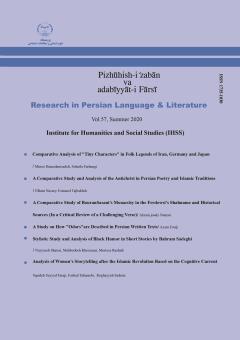A Comparative Study of Bouransasani’s Monarchy in The Ferdowsi’s Shahname and Historical Sources (in a Critical Review of a Challenging Verse)
Subject Areas : Research in Iranian classical literature
1 -
Keywords: Bouran Sasani, Ferdowsi, Shahname, Women in Shahname, History of the Sassanid, Women's monarchy,
Abstract :
Bouran became as the ruler of Sassanid Empire just before downfall of the empire and she was praised in Shahnameh; however, at the beginning of Bouran’s reign, Ferdowsi quotes: “there was a girl named Bouran/ things do not go well, when a woman becomes king”. This verse has an obvious contradiction with next verses and and according to this verse, it seems that the decay of empire at that time was a result of her reign. In order to answer to the question of "which of the two contradictions is true" and "what could be the cause of the mentioned contradiction", the article author has compared the Shahnameh's claim about Bouran's statecraft with historical sources. Research data show that there’s no report of inefficiency in Bouran’s governance, and all historians, in more detail than Ferdowsi, have reported her governing as good. So, why did Ferdowsi compose such a poem? The author, by proposing related hypotheses, concludes that this verse is not related to how Bouran governs, but it has been due to Ferdowsi's commitment to the presuppositions that were formed in related to the religious beliefs in his time. Tracing the presuppositions leads us to a hadith of the Prophet (PBUH): "A nation that leaves its affairs to a woman will never be successful.” The hadith documents do not confirm its validity, and its not even mentioned about in early Shiite sources; But its socio-cultural shadow has led to the presumption that if a woman becomes monarch, the country will be ruined. So, the poet has remained in contradiction between those historical facts and this social presupposition, and the result has been a contradiction in composing the story of Bouran. However, the Shahnameh as a whole, does not confirm the society negative view to the women.
امینی، امین (1389) سکههای ایران قبل از اسلام (موزه کاظمینی) تهران، پازینه.
بلعمی، ابوعلی محمد (1374) تاریخنامه طبری (گردانیده منسوب) تصحیح محمد روشن، تهران، سروش.
بیهقی، ابوالفضل محمد (بیتا) تاریخ بیهقی، تصحیح علیاکبر فیاض، تهران، گام و امین.
بهار، محمدتقی (2535شاهنشاهی/1355شمسی) سبکشناسی یا تاریخ تطور نثر فارسی، چاپ چهارم، تهران، پرستو.
----------- (1322) «دومین ملکه ایرانی»، مجله مهر، سال هفتم، صص 18- 26 و 73- 81 (بازنشر در پایان کتاب زن در ایران باستان، هدایتالله علوی، تهران، هیرمند، 1389، چاپ چهارم، صص 111- 126).
پوربهمن، فریدون (1386) پوشاک در ایران باستان، ترجمه هاجر سیکارودی، تهران، امیرکبیر.
خالقیمطلق، جلال (1394) زنان در شاهنامه، ترجمه احمد بینظیر، تهران، مروارید.
خواندمیر، غیاثالدین بن همامالدین (1333) تاریخ حبیبالسیر، تهران، خیام.
دیاکونوف، میخائیل میخائیلوویچ (1384) تاریخ ایران باستان، ترجمه روحی ارباب، چاپ پنجم، تهران، علمی و فرهنگی.
دینوری، احمدبن داود (1364) اخبارالطوال، ترجمه محمود مهدوی دامغانی، تهران، نشرنی.
زرینکوب، عبدالحسین (1371) تاریخ ایران بعد از اسلام، چاپ ششم، تهران، امیرکبیر.
طبری، محمدبن جریر (1352) تاریخ الرسل و الملوک، ترجمه ابوالقاسم پاینده، تهران، بنیاد فرهنگ ایران.
عجلونی جراحی، اسماعیلبن محمد (بیتا) کشفالخفاء و مزیلالإلتباس عمّااشتُهرَ من الأحادیث علی ألسنة الناس، بیروت (مؤسسة مناهل العرفان)و دمشق (مکتبة الغزالی).
فردوسی، ابوالقاسم (1386)، شاهنامه (ج8) به کوشش جلال خالقی مطلق، تهران، دایرهالمعارف بزرگ اسلامی.
فهیم کرمانی، مرتضی (1371) زن و پیامآوری، تهران، دفتر نشر فرهنگ اسلامی.
کریستینسن، آرتور (1384) ایران در زمان ساسانیان، ترجمه رشید یاسمی، تهران، نگاه.
کونتز، راجر و ویلیام واردن (تابستان1398) «دینار زرین ملکه ساسانی بوران»، ترجمه سامان رحمانی، فصلنامه علمی تخصصی روزگاران، دوره جدید، شماره پانزدهم.
مسعودی، ابوالحسن علی (1370) مروجالذهب، ترجمه ابوالقاسم پاینده، چاپ چهارم، تهران، علمی و فرهنگی.
مطهری، مرتضی (1392) زن و مسائل قضایی و سیاسی، چاپ دوم، تهران، صدرا.
مقدسی، محمدبن طاهر (1374) آفرینش و تاریخ (6جلد در دو مجلد) ترجمه محمدرضا شفیعی کدکنی، تهران، آگه.
ناتل خانلری، پرویز (1354) تاریخ زبان فارسی (ج2)، چاپ سوم، تهران، بنیاد فرهنگ ایران.
نولدکه، تئودور (1358) تاریخ ایرانیان و عربها در زمان ساسانیان، ترجمه عباس زریاب، تهران، انجمن آثار ملی.
ویسهوفر، یوزف (1378) ایران باستان (از550 پیش از میلاد تا650 پس از میلاد) ترجمه مرتضی ثاقبفر، چاپ سوم، تهران، ققنوس.
یارشاطر، احسان و دیگر پژوهشگران دانشگاه کیمبریج (1318) مجملالتواریخ و القصص، تصحیح ملکالشعراء بهار، تهران، کلاله خاور.
------------------------------------------ (1383) تاریخ ایران از سلوکیان تا فروپاشی دولت ساسانیان (جلد سوم- قسمت اول) ترجمه حسن انوشه، چاپ چهارم، تهران، امیرکبیر.


